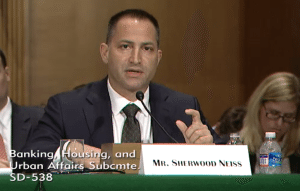
Brazil has a number of similarities to the rest of the world when it comes to funding startups, small or medium enterprises (SMEs). These business owners either have to fund their businesses themselves, seek capital from close friends or family, Angels, VCs, or for some very lucky medium-sized businesses with very strong financials, they may be able to find loans from banks or other institutions (usually at very unfavorable rates/terms). However, none of those are a one-size-fits-all solution and each have their very limited sweet spot and funding size. In most cases, the answer is “there is no capital for your business”.
This is why the funding void exists.
 The funding void is the area where capital doesn’t exist because one source of funding (personal finances, friends, family) ends before another one (VCs) begins. In our research and conversations with ecosystem players in Brazil, this funding void ranges from R$200,000 to R$2,000,000 ($59,000 to $590,000 USD). While most companies do not qualify for Accelerators, those that do can only access up to R$200,000.
The funding void is the area where capital doesn’t exist because one source of funding (personal finances, friends, family) ends before another one (VCs) begins. In our research and conversations with ecosystem players in Brazil, this funding void ranges from R$200,000 to R$2,000,000 ($59,000 to $590,000 USD). While most companies do not qualify for Accelerators, those that do can only access up to R$200,000.
Venture Capital doesn’t begin in earnest until R$5,000,000 (though there are some investors interested in the R$2,000,000 range, including government agency backed VC funds). Hence depending on the size of company and capital needs, this void can be very sizeable and today, there are no funding solutions/strategies in Brazil to address this void.
This is what securities-based crowdfunding aims to fill.
Re-regulation not de-regulation
It is important to understand that crowdfunding is NOT deregulation – it is re-regulation. It is a modern regulatory infrastructure that enables regulators to have better transparency and stronger, more effective investor protections than has ever been possible in the past.
By leveraging tools that we are accustomed to today (e.g. the Internet, regulated crowdfunding websites, online valuation plug-ins, online due diligence tools, online money transfer technologies and online investor relations software) entrepreneurs with viable businesses can upload information about their company, their goals and their investment and investors can review this information, make an investment decision and commit capital. By bringing the process online, it removes the challenges in following up with many individual investors, one-off meetings, and asymmetrical information. It also standardizes the process and hence streamlines both the flow of information and capital.
Bringing the process online creates a digital footprint of the information for regulators who need to police the markets but it also speeds up the entire process. For companies that either live or die based on cash flow, this could be the difference between access to capital or a death blow.
Crowdfunding / Online finance is the first step in the modernization of the private capital markets. This process increases transparency, investor protection, agility and liquidity in private company transactions that have never been possible before.
We can see the benefits of moving public stock markets online 20 years ago. Now technology and our business practices are ready for the private markets to move online.
Three important factors in this process that Brazil should consider:
- Utilize tools to create standardized documentation for crowdfunding offerings. These tools exist today in other countries and can be adapted to use in Brazil. One example of documentation standardization in the US is www.idisclose.com.
- Utilize common data standards across all platforms in Brazil. These data standards are recommended for the required data to help promote transparency, not to give away trade secrets or business practices of platforms or issuers. The crowdfunding industry can work together with regulators to utilize the currently available global data standards on crowdfunding.
- Utilize independent and cost effective business valuation services. Today there are modern services that can render a data-driven business valuation at much lower cost and much faster/easier than was available in the past. These tools promote transparency and investor protection. Brazil should seek out these services that are available today that have global experience and track record that can be offered in the Brazil market for under R$500.
With the right framework, there is much potential
 It takes a company in the United States about 1 year to close a round of financing. As revealed in our Modern Private Capital Markets webinar, thanks to Regulation Crowdfunding (Reg CF) the time to close a round of financing has been reduced to 135 days. These companies are raising on average US$245,000 (~R$831,640). The average successful crowdfunded deal has about 279 investors and these investors are investing on average $879 (~R$2,984) each.
It takes a company in the United States about 1 year to close a round of financing. As revealed in our Modern Private Capital Markets webinar, thanks to Regulation Crowdfunding (Reg CF) the time to close a round of financing has been reduced to 135 days. These companies are raising on average US$245,000 (~R$831,640). The average successful crowdfunded deal has about 279 investors and these investors are investing on average $879 (~R$2,984) each.
Because this is happening online we can tell that if a company does not hit its minimum funding target within 38 days it is likely that the campaign will fail. Currently, 46% of companies using Regulation Crowdfunding are successful.
If you consider that this is the relative beginning of an industry, these numbers are very encouraging.
Brazil can enjoy the same degree of success if it crafts the right policy that fills not only the funding void but gives the industry enough breathing room to expand.
Positive Aspects of the Proposed Crowdfunding Legislation
 In reviewing the proposed framework there are several promising aspects:
In reviewing the proposed framework there are several promising aspects:
- First and foremost, the basic tenants of crowdfunding are well understood. Issuers are allowed to raise money online from investors provided that Platforms are registered with the Comissão de Valores Mobiliários (CVM). This is the most important step to controlling who can raise funds, how information and capital flows and what is captured in a digital footprint. Together this is important in curtailing any potential fraud. The CVM understands that it is the role of the crowd to perform the diligence on an offering and has removed the pre-approval process that was previously required.
- Any type of security including debt and equity instruments are allowed. This allows both retail operations that have customers and cash flow, as well as technology companies that could be part of an acquisition, the ability to raise capital under structures that are beneficial to investors. In other words, this allows for exit potentials from these different types of securities, based on the business type.
- The pool of companies that can benefit from this opportunity was increased to R$10M in Turnover (Revenue) and they can raise up to R$5M per round. Given the data coming out of the US and Europe, these are fair starting points.
- No cap was put on the number of investors that can be part of a crowdfunded offering. This is important particularly when it is likely that developing economies will have many smaller investors over a developed economy that will have fewer, larger investors.
- Investors are capped at investments based on their qualification. Smaller retail investors are capped at R$10.000 per round unless they have gross income or liquid assets greater than R$100.000 and then they can invest up to 10% and Qualified investors have no cap giving them the ability to step in with more capital (provided they have a liquid net worth greater than R$1M)
- Prudent disclosures including a business plan, financial statements, and valuation are mandated as well as risk factors and investor education documents that train investors on failure rates, lack of liquidity, lack of a secondary market, etc.
- We would strongly encourage the CVM to look for new FinTech tools that can assist in the standardization of these offerings, helps issuers create offering memorandums, risk disclosures, and valuation reports.
- And finally, information is required to be reported to the CVM each year including platform activity, number of offerings, number of successes, start and end date of successful offerings, amount raised, valuation and number and type (qualified, retail, etc) of investors.
All this will be good for transparency purposes and bring credibility to the market.
Elements of the Legislation Where We Recommend Improvement
 In reviewing the proposal, there are several hurdles that may impede the ability for securities crowdfunding to flourish. Given our global experience, we suggest the proposal be updated to address the following:
In reviewing the proposal, there are several hurdles that may impede the ability for securities crowdfunding to flourish. Given our global experience, we suggest the proposal be updated to address the following:
- Create suitable escrow service and efficient money transfer services to improve transparency and market efficiency. Also, enable a “cooling off period” and overfunding of capital commitments to improve investor protection and liquidity of transactions:
- We would encourage the government to assist in the creation of alternative escrow solutions that can act as an intermediary. Such FinTech solutions exist elsewhere in the world, are cost effective, technology-enabled, and tackle this challenge seamlessly.
- We would suggest the CVM require all commitments to be affirmative until 72 hours prior to closing. If more than a certain percent of the capital commitments is withdrawn, then all investors need to be notified before offering may close.
- To support this cooling off period, CCA recommends the ability for campaigns to “oversubscribe” by 20% so that in case some investors do rescind their interest during the cooling off period, it does not damage the funding round’s ability to close without hitting its funding target.
- At a minimum, if alternative escrow cannot be utilized at the onset, then the current best practice of ‘signed binding contracts during the offer period and money transfer directly to the (confirmed) company account only if the offer achieves success’ should be recognized and permitted.
- Self-disclosure of financial suitability should continue to be the standard in crowdfunding as it is today in other investing in Brazil. This should be combined with robust investor education/information provided to investors prior to making an investment, about the risks of investing in SMEs and startups. Today, investors in Brazil are not required to disclose their financial information to make an investment. This is based on historical and cultural reasons. To require new financial disclosures for crowdfunding that are not required for any other type of investing will destroy the vast majority of the crowdfunding market, which will waste all of the hard work by the government and industry to create balanced regulation that creates a new way to fund companies. Financial self-disclosure for crowdfunding would impose a burden on a new market that does not exist in any other market in Brazil. We strongly recommend allowing self-certification of investors as long as the investments are made within the regulatory limits. Platforms should notify all investors that if they make material misstatements about their financial position, the platform, issuer and government will be held harmless for the losses.
- Offer greater transparency on the Raise and Spend. The final rules should allow for minimum and maximum funding targets provided that a company show different scenarios for both. This is beneficial for companies that are over funded because they can have stretch goals that are common in rewards crowdfunding that may allow a company to achieve higher results with more capital. Having a baseline minimum target and a corresponding scenario will give investors the opportunity to evaluate whether they believe the company can accomplish its objectives while only hitting a minimum funding target. We believe this is a strong addition.
- Utilize global data standards for issuer/investor information so that platforms can efficiently deliver a data set, on a periodic basis, to the financial regulator that will improve transparency and investor protection: Capital markets operate effectively when there is data and analysts to review the data. Within securities-based crowdfunding there are at least 30 key variables that can provide insight into private offerings. By tracking these variables, the industry, media, and regulators can see where capital is flowing, what types of companies are receiving funding, average valuations and much more. All of this provides transparency and credibility in the market. We would encourage the CVM to either create such a database or partner with the Brazilian Crowdfunding Association to have them collect data and monitor the industry.
- Create a “safe harbor” to limit Portal liability for misstatements by issuers. In the proposed rules Platforms are responsible for the veracity of the information in an issuer’s disclosures. In theory, this seems logical, however in practice it is nearly impossible. Consider a biotech startup that is seeking capital and has Intellectual Property developed by a Ph.D. A platform nor its employees could ever understand the intricacies of that intellectual property nor whether something was factually incorrect. However, another Ph.D. who might be a potential investor may. That is the role of crowdfunding, to have the crowd perform that diligence. Not the platform. To have the platform perform a full audit would be too costly and issuers would never be able to bear those costs. In addition, platforms can’t handle that risk or the costs of that compliance. We would propose that following the tenets of crowdfunding, the process of diligence be done by the investors and any material misstatements that the platform was aware of at the time of disclosure they may be held accountable for those. Platforms should have a responsibility to conduct standards-based diligence on all issuers, and if they follow those standards-based diligence methods, they should not be held liable for misstatements that fall outside of that process. If this issue is not addressed, it will dramatically limit the ability of portals to survive/succeed.
- Support robust communication between investors and issuers via portals and other reasonable/standard communication methods. Please consider fully leveraging the investor protection power of the Web, social media and face-to-face communication. In the proposed rules entrepreneurs are restricted on how they may communicate with investors. Portals are restricted on how they may communicate with investors as well. Issuers and Portals are not allowed any external contact (i.e. telephone, investor events, webinars, etc) with investors. In theory, while this seems logical, it is impractical with how capital formation takes place and actually damages investor protection. The goal of the crowdfunding framework should be to include these forms of communication rather than preclude them. CCA suggests that communication channels be opened to allow issuers and portals to drive investors to the portal to learn more about an offering but restrict the discussions to the information available in the materials made available via the platform. Portals should be allowed to host webinars, recorded calls and investor events such that other prospective investors may benefit from that information if it is digitally recorded and stored on the portal. A critical component to the success of crowdfunding is the crowd. You cannot crowdfund without a crowd and the success of an offering comes down to communicating with the crowd that is closest to an issuer, not those an issuer has no prior relationship with. By supporting robust communication that will be part of the “digital footprint” of the issuer, regulators have a more complete and accurate record of what was communicated and when between issuers and investors.
- Potential investors should be required to register on the crowdfunding platform before they can view issuer information. This is important for issuer security, investor protection, platform security and money laundering protection. Under the proposed rules, investors would not have to register with a portal to review issuer information. This presents 3 significant issues:
- Without having investors register, Portals cannot tell who is reviewing issuer information. In the case of sensitive information or intellectual property this would present a challenge because in a log in scenario, the platform would know which investors are reviewing sensitive information if in the unfortunate case that a competitor was sniffing for intel.
- Without having potential investors register, portals cannot keep potential investors informed as to what is happening with an issuer, on the platform or with the industry in general. This would not allow the platforms to scale commercially. We would recommend that portals be allowed to register any potential investors.
- It is important for both portals and regulators to know who is on their platforms and making investments to protect against money laundering.
Summary
If the goal of securities-based crowdfunding is to get capital to entrepreneurs where it doesn’t exist so they can create, grow and scale businesses and hire people, then the CVM needs to create policy that creates a transparent and credible market without being overly bureaucratic or costly. Within the current ecosystem, traditional funding players (VCs) are limited in their capacity. Securities-
Within the current ecosystem, traditional funding players (VCs) are limited in their capacity. Securities-based crowdfunding can solve this problem. Within the current system, investing in startups and SMEs has been restricted which has created a self-fulfilling culture that investing in startups and SMEs is a challenge. Securities-based crowdfunding can solve this problem. It will also allow more
Securities-based crowdfunding can solve this problem. It will also allow more investors to experiment with long-term investments and alternatives rather than simply putting their money into a savings account. In general, the headlines from the proposed rules are positive but learn from Italy’s mistakes, securities-based crowdfunding requires the right balance, or else if you build it, they will not come.
 Jason Best is co-founder and Principal of Crowdfund Capital Advisors (CCA), Jason Best co-authored the crowdfund investing framework used in the JOBS Act to legalize equity and debt-based crowdfunding in the USA. He has provided congressional testimony on crowdfunding and was honored to attend the White House ceremony when President Obama signed the JOBS Act into law on April 5, 2012. Jason co-founded the crowdfunding industry trade group that works with the Securities and Exchange Commission and FINRA as they create the rules for crowdfund investing. Jason also works with angel groups, PE/VC firms as well as governments and NGOs, including The World Bank, to understand the crowdfunding ecosystem and create successful crowdfund investing strategies. He was instrumental in the successful effort to have CCA selected by the US State Department’s Global Entrepreneurship Program as a Key Partner.
Jason Best is co-founder and Principal of Crowdfund Capital Advisors (CCA), Jason Best co-authored the crowdfund investing framework used in the JOBS Act to legalize equity and debt-based crowdfunding in the USA. He has provided congressional testimony on crowdfunding and was honored to attend the White House ceremony when President Obama signed the JOBS Act into law on April 5, 2012. Jason co-founded the crowdfunding industry trade group that works with the Securities and Exchange Commission and FINRA as they create the rules for crowdfund investing. Jason also works with angel groups, PE/VC firms as well as governments and NGOs, including The World Bank, to understand the crowdfunding ecosystem and create successful crowdfund investing strategies. He was instrumental in the successful effort to have CCA selected by the US State Department’s Global Entrepreneurship Program as a Key Partner.
 Sherwood “Woodie” Neiss, is co-founder and Principal of Crowdfund Capital Advisors, is an expert at building successful businesses. As a 3-time INC500 winner whose company won E&Y’s Entrepreneur of the Year, Sherwood understands the keys to entrepreneurial success from concept to company to sale. As a serial entrepreneur and investor during the credit crunch, Sherwood saw a need for a change in outdated securities laws and did something about it—as a co-founding member of Startup Exemption, Sherwood co-authored the Crowdfunding Framework used in the JOBS Act that was signed into law by President Obama on April 5, 2012. Within Crowdfund Capital Advisors (CCA), Sherwood works with clients ranging from governments and banks that are looking for ways to boost economic development in their countries to investment firms looking for access to increased deal flow that crowdfunding creates. Sherwood serves as an advisor to several crowdfunding platforms and crowdfunding technologies giving him a unique understanding and view of the industry and market. As an industry leader, Sherwood contributes to several publications including VentureBeat and TechCrunch. He additionally wrote Crowdfund Investing for Dummies through Wiley & Son’s.
Sherwood “Woodie” Neiss, is co-founder and Principal of Crowdfund Capital Advisors, is an expert at building successful businesses. As a 3-time INC500 winner whose company won E&Y’s Entrepreneur of the Year, Sherwood understands the keys to entrepreneurial success from concept to company to sale. As a serial entrepreneur and investor during the credit crunch, Sherwood saw a need for a change in outdated securities laws and did something about it—as a co-founding member of Startup Exemption, Sherwood co-authored the Crowdfunding Framework used in the JOBS Act that was signed into law by President Obama on April 5, 2012. Within Crowdfund Capital Advisors (CCA), Sherwood works with clients ranging from governments and banks that are looking for ways to boost economic development in their countries to investment firms looking for access to increased deal flow that crowdfunding creates. Sherwood serves as an advisor to several crowdfunding platforms and crowdfunding technologies giving him a unique understanding and view of the industry and market. As an industry leader, Sherwood contributes to several publications including VentureBeat and TechCrunch. He additionally wrote Crowdfund Investing for Dummies through Wiley & Son’s.

